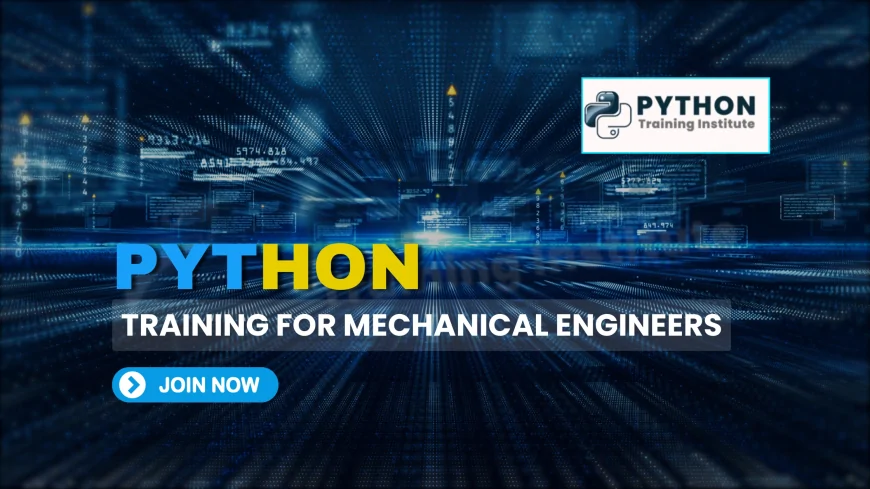Python Training for Mechanical Engineers in Pune | Career-Focused Python Training for Mechanical Engineers in Pune
Discover top Python training programs in Pune tailored for mechanical engineers. Learn how Python is revolutionizing CAD, automation, and data analytics. Find hands-on, job-ready Python courses with project experience and placement support.

Table of Contents (HTML Format)
- Introduction
- Why Python for Mechanical Engineers?
- Applications of Python in Mechanical Engineering
- Course Curriculum Tailored for Mechanical Engineers
- Top Python Training Institutes in Pune
- Benefits of Certification
- Career Opportunities After Python Training
- Internships and Job Support in Pune
- Student Success Stories
- How to Choose the Right Python Course?
- FAQs
- Conclusion
Introduction
Mechanical engineers in today’s evolving industry are no longer confined to machines and blueprints. With the rise of automation, data analytics, and simulation tools, programming knowledge—especially in Python—has become essential. This article explores how mechanical engineers in Pune can gain a competitive edge by enrolling in Python training programs specifically designed for their field.
Why Python for Mechanical Engineers?
In the modern age of Industry 4.0, mechanical engineering is evolving rapidly. While traditional skills like CAD design, thermodynamics, and materials science remain important, the demand for interdisciplinary knowledge is growing fast—and this is where Python comes in. Python is one of the most powerful tools mechanical engineers can learn today to thrive in automation, data analysis, and product innovation.
Easy to Learn and Use
Python's clean syntax and readability make it an excellent first programming language for mechanical engineers. Unlike low-level languages like C or C++, Python allows engineers to focus on solving problems rather than worrying about complex code structure.
Automation of Repetitive Engineering Tasks
Mechanical engineers often perform calculations, create design iterations, or manage large data sets. Python makes it easy to automate simulations, calculations, and file handling—saving time and reducing manual errors.
Data Analysis and Visualization
Python supports powerful libraries like Pandas, NumPy, and Matplotlib, which help in analyzing test results, experimental data, or design parameters. Engineers can make data-driven decisions, improving accuracy and efficiency in design and production.
Integration with CAD/CAE Tools
Python can interface with popular engineering tools such as:
-
SolidWorks API
-
ANSYS and OpenFOAM
-
AutoCAD
-
MATLAB/Simulink
This integration enables engineers to script repetitive CAD tasks, run batch simulations, or automate geometry generation.
Useful for IoT and Embedded Systems
With Python, engineers can develop prototypes using Raspberry Pi or Arduino to create smart mechanical systems, predictive maintenance models, and automated test setups.
Transition into High-Tech Careers
Python skills open doors beyond traditional mechanical roles:
-
Robotics
-
Mechatronics
-
Automotive software development
-
Smart manufacturing and Industry 4.0
-
Machine learning for predictive modeling and fault detection
Global Demand for Python-Skilled Engineers
Many industries now seek mechanical engineers who are Python-literate. Whether in aerospace, automotive, or manufacturing, Python proficiency is often a differentiating factor in hiring decisions.
Summary
Learning Python allows mechanical engineers to:
-
Automate design and analysis
-
Handle engineering data efficiently
-
Integrate with mechanical software tools
-
Build smart hardware systems
-
Enhance career opportunities in tech and R&D
If you're a mechanical engineer in Pune aiming to future-proof your skills, Python is a must-have tool in your engineering toolkit.
Applications of Python in Mechanical Engineering
Here’s how Python applies to core areas of mechanical engineering:
1. Automation and Scripting
Use Python to automate design calculations, BOM generation, and batch CAD file conversions.
2. Computational Fluid Dynamics (CFD)
Python interfaces with OpenFOAM and ANSYS for post-processing CFD results.
3. Finite Element Analysis (FEA)
Automate FEA simulations, visualize mesh results, and generate reports using libraries like matplotlib and NumPy.
4. Data Acquisition and Analysis
Engineers use Python to collect sensor data, analyze test results, and generate plots and dashboards.
5. Internet of Things (IoT)
Python supports Raspberry Pi and Arduino for hardware prototyping, enabling engineers to build smart mechanical systems.
6. AI for Predictive Maintenance
Python-based ML models help predict failures and improve maintenance strategies.
Course Curriculum Tailored for Mechanical Engineers
A specialized Python course for mechanical engineers in Pune usually includes:
-
Basics of Python Programming
-
Python for Mathematical Computation
-
File Handling and Automation Scripts
-
Data Analysis using Pandas, NumPy
-
Visualization using Matplotlib & Seaborn
-
Python in CAD and CAM Automation
-
Python for IoT and Hardware Projects
-
Mini and Capstone Projects
Most courses blend theoretical learning with real-world engineering projects.
Top Python Training Institutes in Pune
WebAsha Technologies
Offers project-driven learning and placement support. Good for IoT and mechanical automation.Is one of Pune’s reputed training centers that offers a comprehensive range of Python courses—from foundational programming to advanced domains like full-stack development, data science, AI/ML, Django, and microservices.
Key Features
1. End-to-End, Industry-Oriented Curriculum
-
Covers essentials like OOP, multithreading, sockets, GUI (Tkinter), database integration, web programming (CGI), and advanced modules.
-
Tailored tracks on full-stack Python, Django, Flask, microservices, REST APIs, and data science analytics.
Hands-On Learning & Live Projects
-
Real-world case studies and live project work embedded into training.
-
Small class sizes ensure personalized attention and effective monitoring.
3. Career-Focused Support
-
Dedicated job assistance: resume building, mock interviews, and access to placement groups with hiring ties.
-
Reports indicate 1,500+ placements last year with 90% success from alumnitraining.webasha.com.
4. Experienced Trainers
-
Instructors with 12+ years of professional experience from tech firms like IBM, Airtel, RedHat.
-
Trainers remain active in live development—bringing real-world insights to the classroom.
5. Flexible & Affordable Programs
-
Offers small batch sizes, flexible schedules (days/evenings), hybrid modes, and corporate training.
-
Multiple payment options: UPI, cards, net banking, EMI, group discounts—making it accessible for individuals and teams.
6. Ongoing Learning Support
-
Offers post-training assistance, session make-ups for missed classes, and extended lab access.
-
Globally-aligned courseware and regularly updated curriculum.
Benefits of Certification
Earning a Python certification provides:
-
Proof of skill for job applications
-
A competitive edge in core & interdisciplinary roles
-
Opportunity to shift into tech, analytics, and automation
Most institutes in Pune offer globally recognized certificates or tie-ups with NASSCOM/NSDC.
Career Opportunities After Python Training
Post-training, mechanical engineers can explore roles like:
-
Automation Engineer
-
Mechanical Data Analyst
-
IoT Systems Developer
-
Python Developer (with engineering background)
-
Simulation Engineer
-
R&D Automation Specialist
Python opens doors to cross-functional roles across manufacturing, automotive, aerospace, and robotics.
Internships and Job Support in Pune
Many institutes in Pune provide:
-
Resume building and portfolio development
-
Mini-projects and live projects with local startups
-
Internship tie-ups with automotive and R&D firms
-
Mock interviews and aptitude training
Look for institutes with placement records, alumni support, and connections with MNCs or product companies in Pune’s industrial zones.
Student Success Stories
Several mechanical engineers have transitioned into roles like Python Developers, Simulation Analysts, and IoT System Designers. Testimonials often cite:
-
Personalized mentorship
-
Industry-relevant projects
-
Career counseling and placement drives
Success stories reflect Python’s growing adoption in core engineering industries.
How to Choose the Right Python Course?
Before enrolling, consider:
-
Whether the course is designed for mechanical engineers
-
Availability of real-world projects
-
Trainer experience and industry background
-
Internship and placement support
-
Student reviews and success rate
Attend demo sessions if available and compare syllabi.
FAQs
1. Is Python difficult for mechanical engineers to learn?
No, Python has simple syntax and is beginner-friendly, even for non-programmers.
2. What is the duration of these courses?
Typically 6–12 weeks for part-time and 1 month for full-time programs.
3. Do I need programming experience?
Not necessarily. Courses start from scratch and build up.
4. What kind of projects will I work on?
Projects include automation scripts, CAD integration, data analysis, and IoT systems.
5. Is job placement included?
Yes, most reputed institutes offer placement or internship assistance.
6. Will it help in my core mechanical job?
Yes, especially in roles involving automation, design, and testing.
7. Can I take these courses online?
Yes, many institutes offer hybrid or fully online options.
8. How much does a course cost?
Course fees range from ₹10,000 to ₹35,000 depending on the institute and duration.
9. Is there certification?
Yes, most courses offer certifications recognized by industry and sometimes international bodies.
10. Will Python help in M.Tech or research?
Absolutely. Python is widely used in research simulations and data analytics.
11. What tools will I learn?
Python IDEs, NumPy, Pandas, Matplotlib, Raspberry Pi (IoT), CAD APIs.
12. Are these courses suitable for final-year students?
Yes, especially if you're looking to enhance your final-year project.
13. Can I switch to a software role?
Yes, Python gives you an edge in transitioning to roles in software and analytics.
14. Are there weekend batches available?
Yes, most institutes offer weekend and evening batches for working professionals.
15. Do I need my own laptop?
It’s recommended but not mandatory. Institutes often provide lab access.
16. Do institutes provide learning material?
Yes, including video lectures, eBooks, code samples, and quizzes.
17. What is the average salary after training?
Freshers can expect ₹3–6 LPA; experienced professionals up to ₹12 LPA depending on domain.
18. Can I learn Python and use it with SolidWorks?
Yes, Python can be integrated using API scripting with CAD tools.
19. How do I showcase my skills post-course?
Create a GitHub portfolio, add projects to your resume, and earn certifications.
20. Which is the best Python institute in Pune for mechanical engineers?
Institutes like WebAsha, Ethans Tech, and 3RI Technologies are popular choices.
Conclusion
Python is no longer just for software developers. It is now a powerful tool for mechanical engineers aiming to automate tasks, analyze data, and enter the world of smart systems. Pune offers a growing ecosystem of training institutes that deliver job-ready, industry-aligned Python courses for engineers. Whether you're a student, a working professional, or someone looking to pivot your career, investing in Python training can significantly enhance your engineering future.
What's Your Reaction?
 Like
0
Like
0
 Dislike
0
Dislike
0
 Love
0
Love
0
 Funny
0
Funny
0
 Angry
0
Angry
0
 Sad
0
Sad
0
 Wow
0
Wow
0














